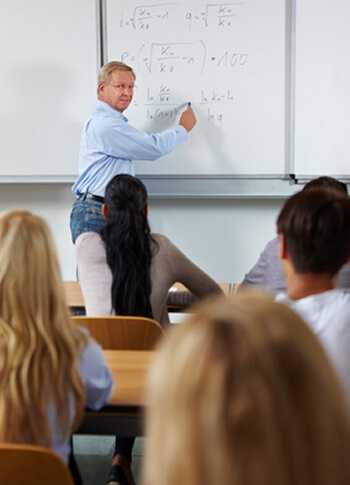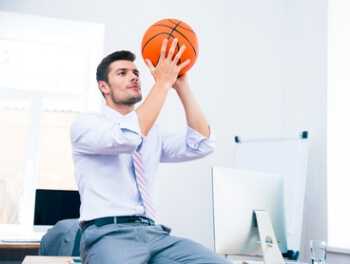
Sports and fitness training – All information
A career in the field of sports and fitness is also possible without an academic degree: Numerous further education courses enable the start of a career or offer the opportunity to further develop and qualify for new tasks. Below we have compiled basic information so that you can make the right decision regarding your further education.
Table of Contents
There Many sports and fitness training courses organized as temporally and spatially flexible distance learning course are, they are also suitable for working people. The offer includes a wide range of different courses that specialize in different areas – from various coach licenses on a training to (sports) nutrition consultant, to the fitness and wellness coach. Athletes can find a suitable offer for every interest and every professional goal within the sports industry.
Already informed? Search directly for further education:



All the information you need for further education
Requirements for a sports education
 Depending on the provider, the type of training and the desired degree, there are very different requirements, which prospective and applicants for participation in the various sports and fitness training must meet.
Depending on the provider, the type of training and the desired degree, there are very different requirements, which prospective and applicants for participation in the various sports and fitness training must meet.
While some training courses require only a degree of practical experience in sports and a basic interest in the subject matter, others are demanding that candidates complete their school leaving certificate or have already obtained training licenses. Depending on the institute, a completed vocational training in a suitable occupational field as well as specific work experience may be required.
In addition, many providers include additional requirements, such as successfully completing a personal motivation interview or admission test, in the application process.
A special position has further education, where you can purchase the various coach licenses. These are structured according to an ABC system, build on each other and must therefore be completed in a specific order. The C license is usually the basic qualification, which is suitable for both full-time and part-time gym staff as well as for newcomers interested in sports. Based on this, the B-license (advanced level) or later the A-license (upper level) can be acquired, which represents the highest qualification level and qualifies the graduates for a self-employment in a studio or other sports facility.
For some study providers, career changers have the option of participating in Level B trainings without a C license. For this purpose, only practical experience or a minimum age of 18 years and a school leaving certificate are required.
Many differences, therefore, research is important!
As you can see, there are major differences in terms of eligibility requirements for training in sports and fitness. Therefore, it is advisable to inquire early about the required qualifications at the institute of your choice. The corresponding information can usually be found on the homepage of the respective provider.
Continuing education duration and course
 Similar to the study requirements, there are also great differences in the duration and course of the various further education courses. While some have a duration of only a few days or weeks, others are designed for a period of several years.
Similar to the study requirements, there are also great differences in the duration and course of the various further education courses. While some have a duration of only a few days or weeks, others are designed for a period of several years.
There are also variations in the course. While the shorter trainings are usually organized as purely face-to-face events, the majority of courses are longer lasting than correspondence course built in which phases of self-study and attendance alternate with each other. In the self-study phase, participants receive so-called study booklets to support them or, if necessary, call up the materials needed for learning online.
The class lectures are usually carried out at the respective institute itself and serve the practical application of the learned contents. In order to enable the participation also for professionals, they usually find on the weekends or in the form of a block seminar. Most providers also have several locations throughout Germany in different cities to avoid long journeys for the participants.
How do I recognize a good and serious sports / fitness training??
Most further education in the sports and fitness area are carried out either in the form of an extra-occupational distance learning course or in the form of a classroom event, the duration of which can vary greatly.
Which form of further education suits you best depends on your personal circumstances and interests as well as your professional goals. However, you should be aware that there are big differences in quality and recognition training.
As it is in the field of sports and fitness hardly any officially recognized degrees (the exception is the IHK-certified further training courses, training as a physiotherapist or masseur, as well as academic programs), one must set other evaluation criteria here.
ZFU as a quality seal for distance learning courses
 In the jungle of innumerable training courses, it is not so easy to see which of the courses and study programs are of high quality and which one should better keep their hands off. Unfair promises are unfortunately part of the industry, and many of the offers do not keep what they promise despite high subscriber fees. A possible help can be, for example, certificates. In the field of distance learning courses occupied especially the seal of the state central office for distance education (ZFU), that it is a high quality offer.
In the jungle of innumerable training courses, it is not so easy to see which of the courses and study programs are of high quality and which one should better keep their hands off. Unfair promises are unfortunately part of the industry, and many of the offers do not keep what they promise despite high subscriber fees. A possible help can be, for example, certificates. In the field of distance learning courses occupied especially the seal of the state central office for distance education (ZFU), that it is a high quality offer.
In the field of on-the-job training, however, the situation is less clear. There are different systems and certificates, all of which suggest that the lessons offered are a quality offer – but this does not always have to be the case.
Criteria that distinguish good training providers
Irrespective of this, there are some universally valid criteria for recognizing high-quality further education:
- The provider requires for the participation of certain previous knowledge and qualifications
- The training has a relatively high proportion of practice
- Speakers and course instructors have many years of professional experience
- The study counseling of the institute answers your questions comprehensively, properly and friendly
- Transparent information policy on costs, methods and teaching staff
- The provider names a concrete target group, on which the training is designed
Stiftung Warentest can help too
Recently, the Stiftung Warentest has increasingly taken further training courses under the microscope. On the website test.de in the resort "education & job" you can see the tests (and possibly buy). The Foundation has also published a Distance Learning Guide and a checklist of questions that course seekers should ask course providers before booking to avoid any nasty surprises.
Gain experience
If you are still unsure: seek the exchange! Colleagues and working acquaintances from the industry or people in sports and fitness-specific online forums often have a lot of know-how and expertise to offer, and can usually assess well whether or not they want to participate in specific training.
If possible, you can of course also exchange with graduates of a continuing education and talk to them about their personal experiences. Even professional networks on the Internet can be a good help. Compare the biographies of professionally successful people and see what training they have completed to achieve their professional status.
Alternative extra-occupational study
You have set yourself higher goals and sooner or later aspire to a leadership position in the field of sports? Then start with an extra-occupational study! The big advantage of this: you continue to work in your profession, relate your salary and can put your knowledge acquired in the study immediately into practice.
Related Posts
-

Mba entrepreneurship, all courses – infos
MBA study entrepreneurship Entrepreneurs recognize opportunities and opportunities, make independent decisions and therefore bear a great responsibility….
-

Tracker for children in comparison ▷ the best fitness tracker – with gps
Tracker for children in comparison: Fitness, Activity, GPS – Which trackers are useful? Fitness trackers also help children to better take care of their…
-

MBA degree Sports Management / Sport Would you like to qualify for a further career in the sports industry or acquire additional sports economic…
-

How does bladder training work? bladder training
How does bladder training work?? People with an overactive or weak bladder are often forced to go to the toilet immediately by an increased urge to…
